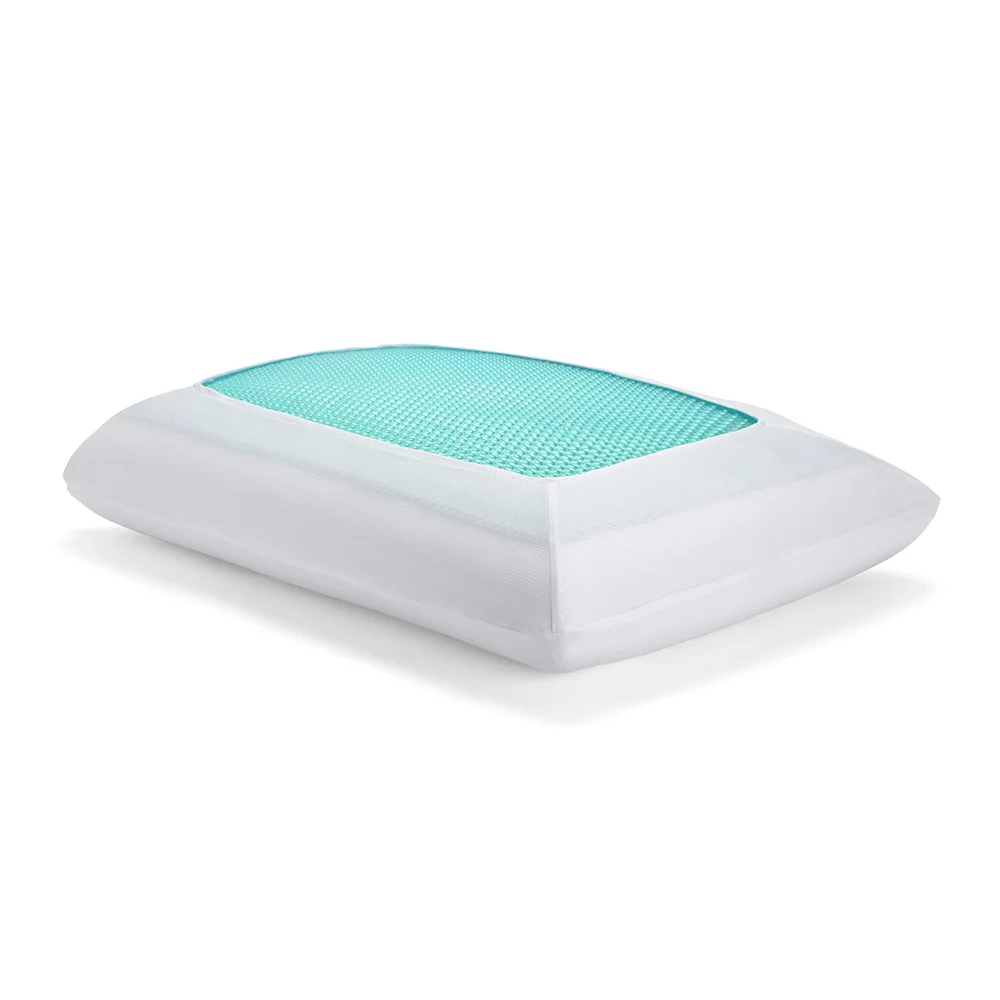Should I leave the AC running at night? 3 reasons sleep experts say you shouldn't if you want a really good night's rest
For improved sleep quality and lower energy costs, you might want to consider turning that AC off

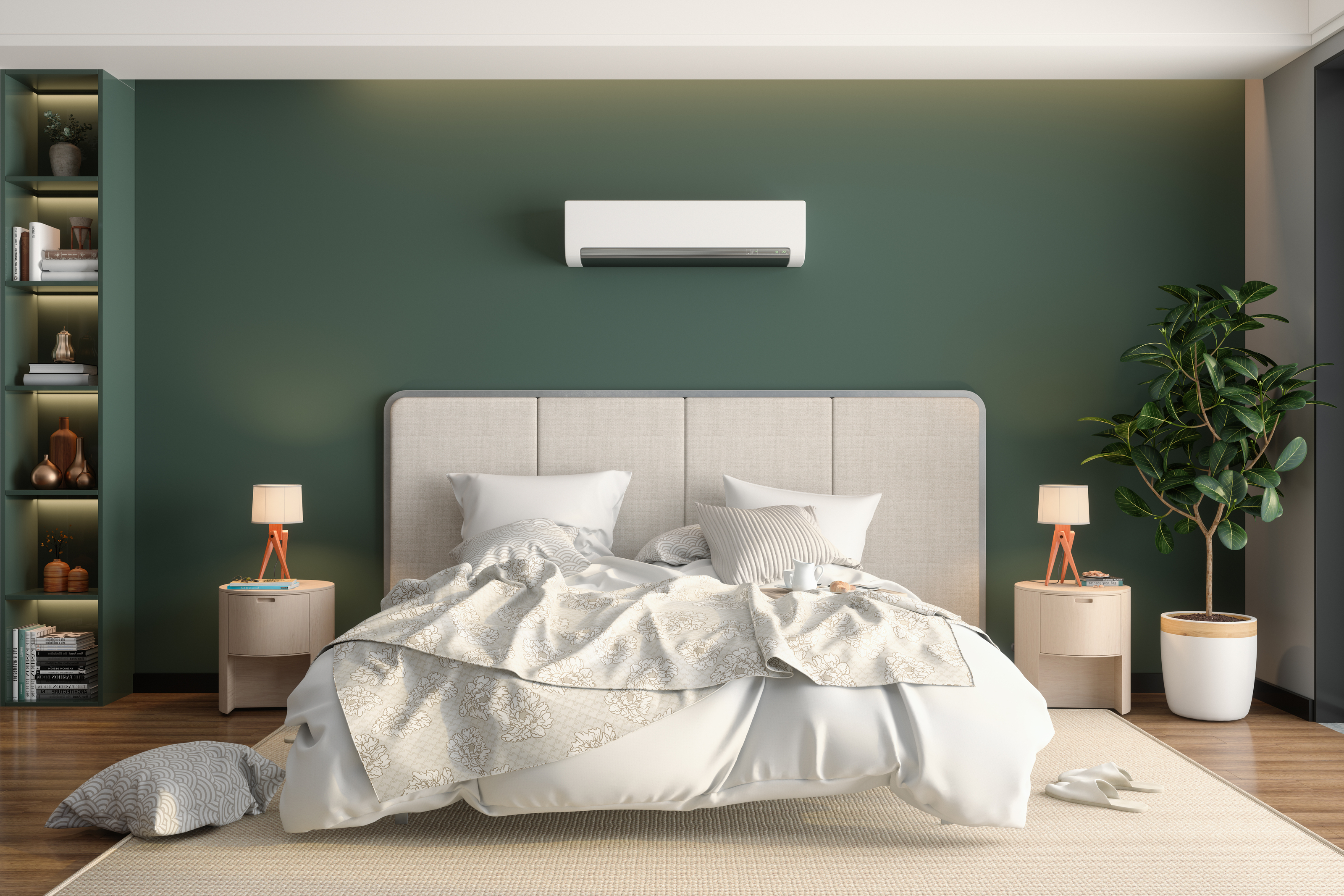
The Livingetc newsletters are your inside source for what’s shaping interiors now - and what’s next. Discover trend forecasts, smart style ideas, and curated shopping inspiration that brings design to life. Subscribe today and stay ahead of the curve.
You are now subscribed
Your newsletter sign-up was successful
There are a lot of things to love about summer, but sweaty and uncomfortable sleep isn't one of them. There's nothing worse than thrashing around in a tangle of sheets - one leg in, one leg out - as you try to cool down enough to get your all-important shut-eye. If you're lucky enough to have it, switching on the air conditioning can offer some sweet release, but should you really be leaving your AC on all night?
Without a doubt, aircon units are the best way to cool a room down quickly. When high temperatures and humid conditions make sleeping a struggle, the continuous waft of cool air and the gentle hum of the machine really can feel like the ultimate luxury. But, while it might help you sleep better at first, experts warn that leaving the AC on overnight may not be the best idea in the long term.
From increased energy costs to potential health risks, there are a host of reasons why you might not want to run your aircon through the night, and they outweigh the benefits of that initial blissful breeze. We spoke with some sleep and appliance experts to find out more, and their reasoning might change your relationship with your AC for good.
Is it bad to leave AC on all night?
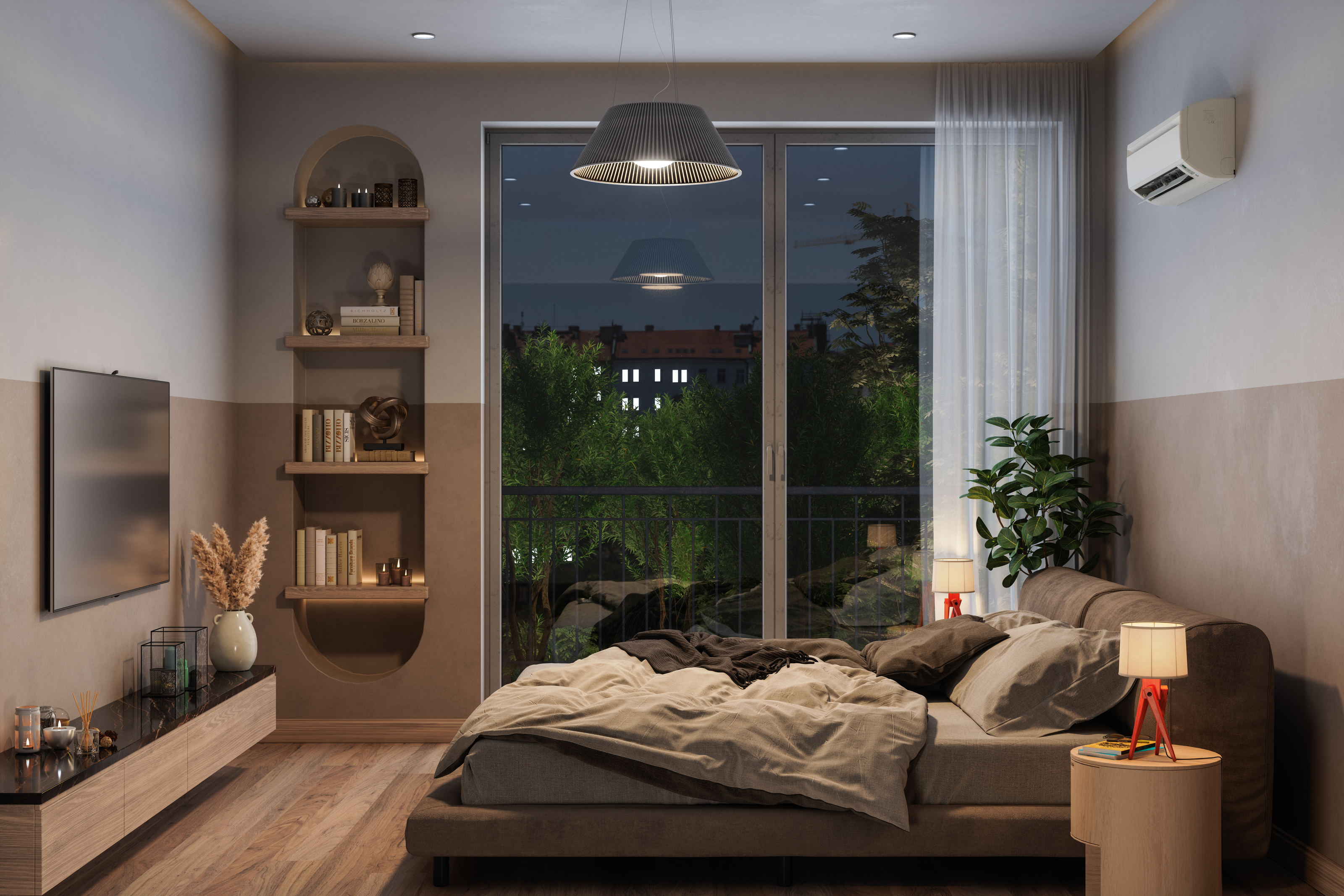
When it comes to how to cool down a room, AC is the obvious choice. But, as tempting as it might be to leave your aircon on to stay cool through the night, experts say it might not be doing you any favors.
First off, there are several health implications to consider. 'When you sleep at night, your body’s internal temperature drops, which helps promote better sleep,' explains Christine Kingsley, Health and Wellness Director of the Lung Institute. 'However, if the temperature of your AC drops the room temperature lower, your immune system will slow down, making you more susceptible to conditions, such as a common cold or a dry cough.'
You're also more likely to wake up dehydrated if you sleep with the AC on in your bedroom, too. 'This is because AC can also dehumidify the air as part of its cooling process,' notes Christine. 'This can lead to a dry throat, mouth, lungs, and eyes, which can eventually lead to an irritated respiratory system.'
As well as these adverse effects, air conditioners are hungry energy consumers. If you're conscious about cutting your energy costs and doing your bit for the planet, you ought to turn the AC off before you sleep. 'ACs consume a large amount of energy, which can add up over time if left on all day,' explains Matt Kerr, a Machine Learning Engineer and the founder of Applianced Geeked.
The Livingetc newsletters are your inside source for what’s shaping interiors now - and what’s next. Discover trend forecasts, smart style ideas, and curated shopping inspiration that brings design to life. Subscribe today and stay ahead of the curve.
That being said, Matt's keen to note that leaving AC on continuously could actually be more economical than turning it on in intervals. 'Leaving the air conditioner on overnight helps it to cool down without working overtime, resulting in decreased energy expenditures,' he says. With this in mind, it's a good idea to run the AC continuously for a few hours in the evening before going to sleep.
What are the benefits of turning your AC off at night?
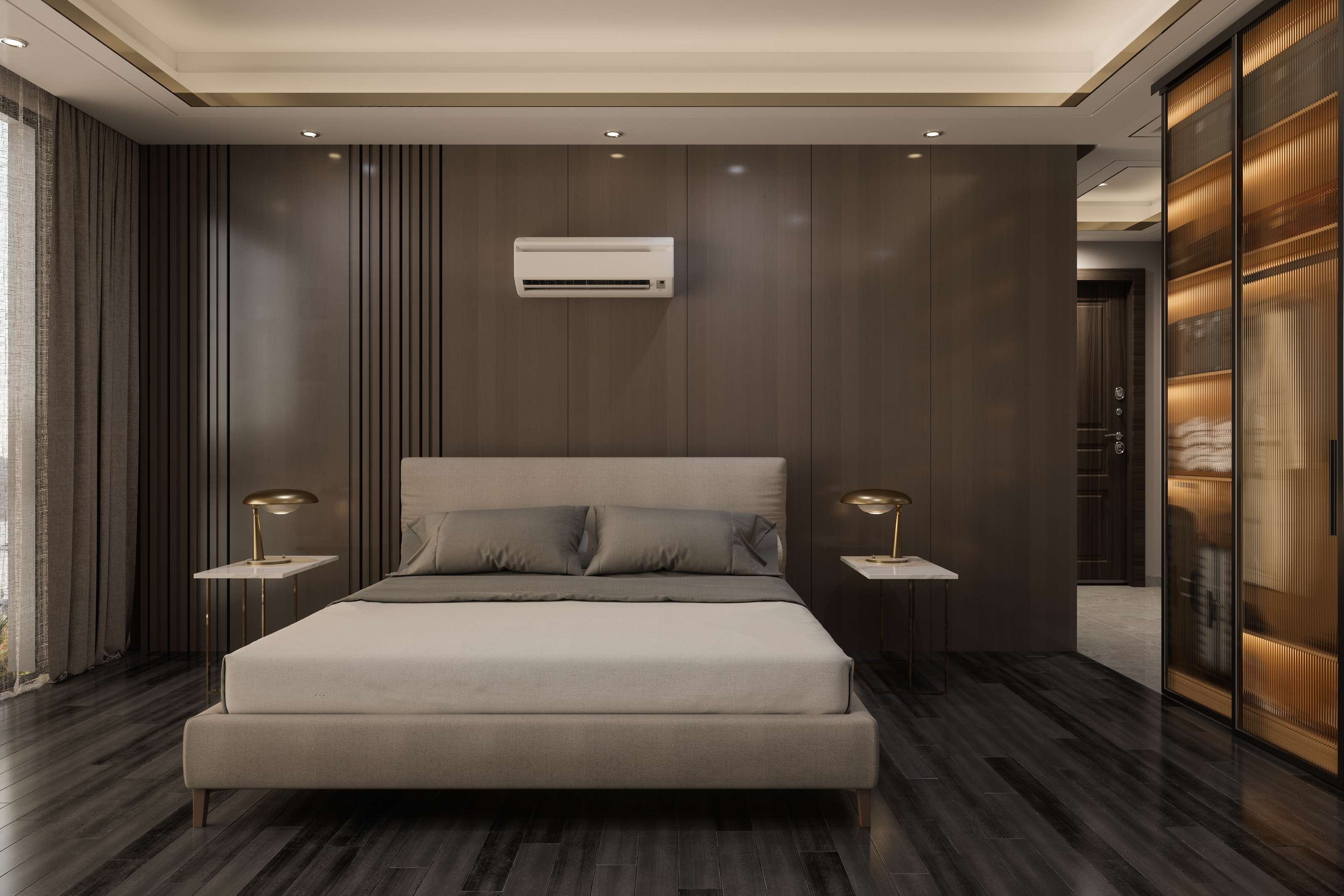
There are a host of advantages that come with turning off your AC at night, and while switching it on might be a core part of your bedtime ritual, knowing these insights could change your habits once and for all.
1. Turning of AC overnight is better for your health

We already touched upon the health impacts that result from sleeping with the AC on, and while it might sound counterintuitive - especially since cooler environments are said to be better for sleep - a stuffy bedroom is actually preferable to one that's air-conditioned throughout the night.
'Due to low moisture levels and a lack of fresh, filtered air, AC might produce sluggishness, lethargicness, and headaches,' says Matt. 'Acclimatization to cold air can also have negative consequences on the body, making it harder for the internal thermostat to adjust to warmer conditions, generating internal and external tension, and eventually lowering general well-being.'
You're also less likely to become ill if you turn the AC off while you sleep. Not only can the colder temperatures affect your immune system, but aircon machines can circulate infectious air. It's especially important to avoid if you suffer from allergies too, since unlike air purifiers, AC doesn't clean your air. As Christine explains: 'An AC will circulate the air inside your room, but it will also circulate any allergens that are present in the air – dust, mites, spores, and pollen. Without an AC, you can prevent subsequent respiratory conditions, such as runny nose, itchy throat, sneezing, and even breathing difficulties.'
2. You'll save energy (and money)
We're all looking for ways to save energy, and turning your AC off overnight is a good place to start. 'If you turn your air conditioner off at night, you can save energy and money,' says Isabella Gordan, sleep expert and CEO of Sleep Society. 'It also helps to reduce your carbon footprint since there is less strain on the power grid and fewer emissions released into the atmosphere.'
Turning off your aircon appliance will also reduce strain on the machine and improves overall efficiency. 'Furthermore, continuous operation might cause the air to get overly cold, which could harm the evaporator or coiling coil component,' says Matt.
3. Turning off aircon can help you sleep better
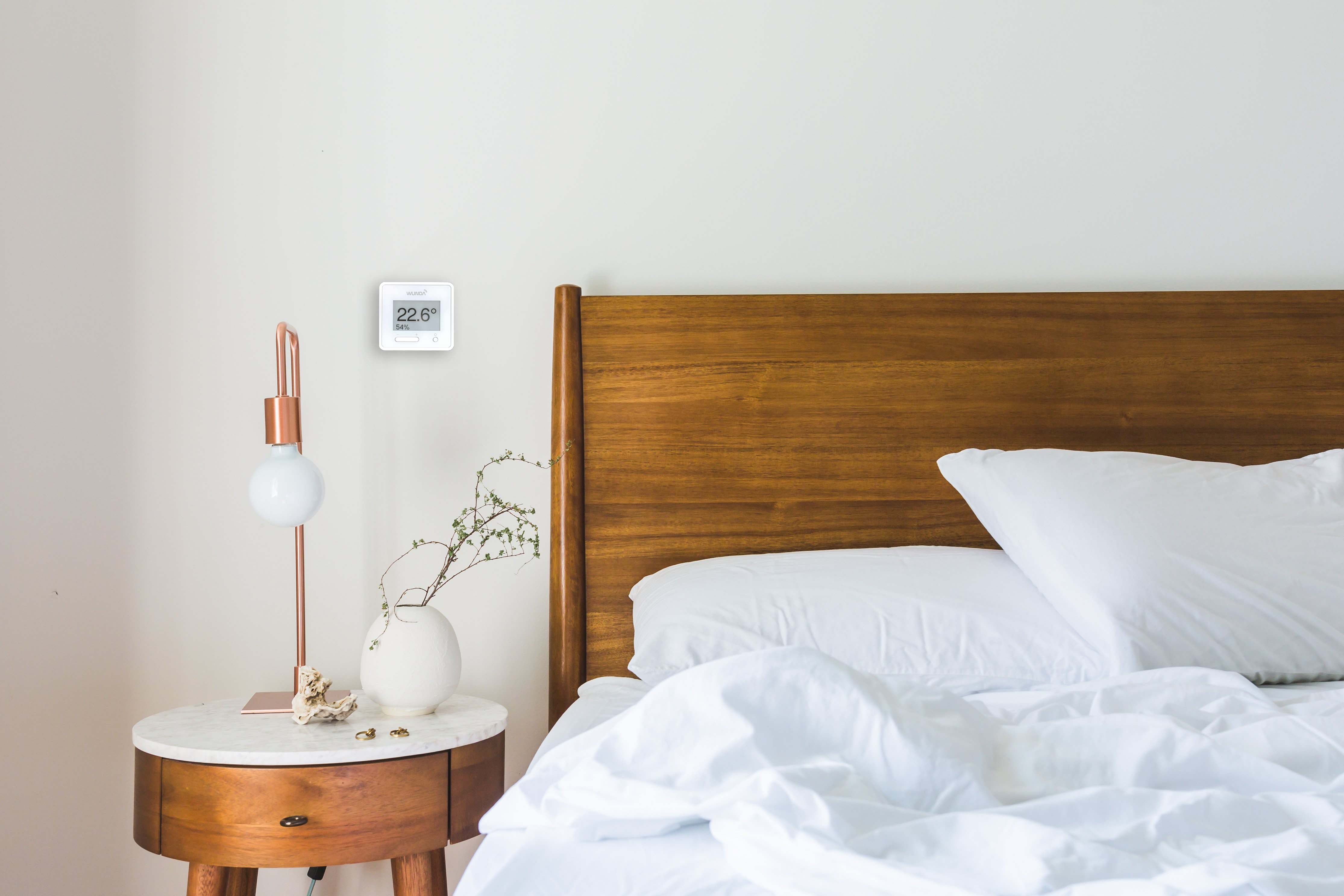
In general, a slightly cooler environment is best for helping you sleep, but continuous AC can actually make a room too cold, causing disruptions to your sleep pattern. As Christine points out: 'By turning off the air-conditioning you can avoid sleep disturbance caused by shallow temperatures. Sleeping in an environment that’s too cold for your body can negatively impact your sleep quality as the cold can wake you up shivering.' Older AC machines can also be quite noisy, which can also contribute to disrupted sleep.
How do you stay cool at night without AC?
If you're wondering how to sleep in heat without AC, fear not - there are plenty of alternative ways to cool a room that don't require costly appliances.
'Consider updating to a programmable thermostat, employing fan mode instead of cooling mode, and maximizing natural ventilation by opening windows and using ceiling fans to keep cool while sleeping,' says Matt.
You can also make some small changes to your habits before going to bed to help you sleep better at night without using your AC. 'Start by taking a cold shower before going to sleep as it can help cool your body down by lowering your core temperature,' says Christine. 'You also have the option to take a hot shower before sleeping. There’s research that proves the credibility of warm showers before sleeping as they can help with the body’s natural temperature regulation process.'
Last but not least, the type of bedding you chose will have a big impact on your temperature. The Livingetc team as a whole is big fan of TENCEL™, a type of cotton-like fabric that is incredible for moisture-wicking and an absolute bonus for long hot nights. As Isabella notes: 'Lightweight bedding and loose-fitting clothing are great for wicking away moisture from your skin and allowing airflow over your body which can be quite effective at cooling you down.' Choose a low tog summer duvet and materials like TENCEL™ to help keep you cooler, or consider a mattress or pillow with cooling gel technology.
What temperature should a bedroom be?
If you're looking to create the perfect sleep environment, it helps to know the ideal temperature for sleeping. 'For optimal comfort and efficiency when sleeping at night, set your thermostat so that the temperature is around 72-75 degrees Fahrenheit,' says Isabella. 'This will help you stay cool without running up an excessive energy bill.' Of course, personal preference will differ from person to person, but this window should be a comfortable and happy medium for most.
Keep your sleep space cool with these options

Lilith Hudson is a freelance writer and regular contributor to Livingetc. She holds an MA in Magazine Journalism from City, University of London, and has written for various titles including Homes & Gardens, House Beautiful, Advnture, the Saturday Times Magazine, Evening Standard, DJ Mag, Metro, and The Simple Things Magazine.
Prior to going freelance, Lilith was the News and Trends Editor at Livingetc. It was a role that helped her develop a keen eye for spotting all the latest micro-trends, interior hacks, and viral decor must-haves you need in your home. With a constant ear to the ground on the design scene, she's ahead of the curve when it comes to the latest color that's sweeping interiors or the hot new style to decorate our homes.


